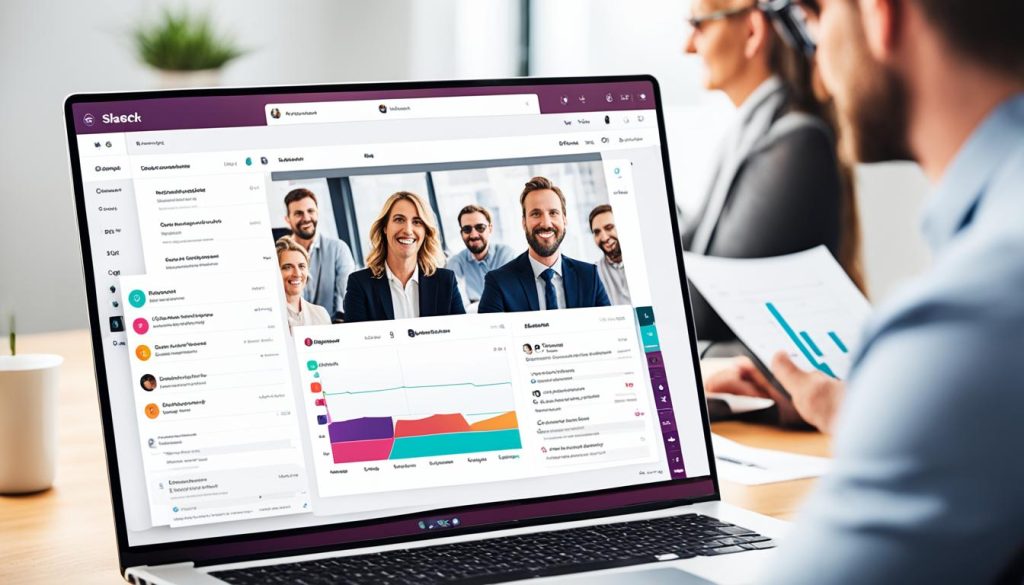In today’s fast-paced business environment, small businesses in the UK must leverage technology to stay competitive. Using the right apps can streamline operations, boost productivity, and drive growth.
From business management apps to productivity tools and free mobile apps for SMEs, these solutions help companies stand out. Choosing the best CRM apps, small business apps, and free business apps for Android can support every part of a business plan.
This article will explore the top 10 apps for small businesses in the UK, focusing on tools that enhance teamwork, simplify tasks, and promote sustainable growth for businesses of all sizes.
Why Small Businesses Need the Right Apps?

Running a small business often means juggling various tasks—managing finances, overseeing projects, building customer relationships, and handling daily operations. Without the right tools, these responsibilities can become overwhelming.
In 2025, business apps have become essential for simplifying these processes, providing user-friendly, cost-effective solutions that save time and resources.
Whether it’s streamlining communication, managing remote teams, or securely storing files in the cloud, apps are transforming the way businesses operate, making them more efficient and collaborative.
In today’s fast-paced, tech-driven world, small businesses need to leverage these tools to remain competitive and agile.
Here’s why choosing the right apps is crucial for success:
- Boosts productivity by organising tasks and tracking projects, ensuring deadlines are met.
- Saves time and money by automating routine processes like invoicing and payroll.
- Improves collaboration through real-time communication tools, enhancing teamwork.
- Strengthens customer relationships with CRM apps that help manage leads and follow-ups.
- Ensures data security and accessibility with cloud-based apps that protect vital business information.
- Scales with your business by offering flexible features that grow as your business expands.
Using the right apps ensures that small businesses remain efficient, productive, and ready for growth in a rapidly evolving digital landscape.
10 Best App for Small Businesses
1. QuickBooks

QuickBooks is excellent for small businesses needing a strong accounting system. It’s cloud-based, so it’s easy to use through any device. This software helps with tracking expenses, producing reports, and managing billing. It’s perfect for small firms wanting to sort out their money matters smoothly.
QuickBooks really shines with its easy link up to other business tools. This means less jumping between software. It covers everything from paying staff to keeping an eye on stock. So it fits well with what small and medium businesses need.
| Feature | Description |
|---|---|
| Expense Tracking | Easily categorise and monitor business expenses, giving insights for planning and tax work. |
| Invoicing | Create invoices that look professional, set up regular bills, and see which payments are due. |
| Reporting | It makes detailed financial reports to help make smart business choices. |
| Integrations | It links neatly with lots of different business apps, like payment systems and customer management. |
Using QuickBooks, small businesses can tidy up their money management and make billing better. It also helps you understand your finances better. Whether you’re just starting out or already busy, QuickBooks is a great choice to help improve your financial game.

2. Slack
In today’s quick business world, good communication is key for small businesses to do well. Slack is a famous tool that makes talking, sharing files, and working on projects together easy. It’s great for when teams are spread out too.
It’s a great way for small businesses to keep up with each other, throwing out the mess of email threads. It’s easy to use and hooks up with lots of other apps, making work smoother. This makes Slack top-notch for team chat apps and collaboration apps for SMEs, enhancing internal communication tools for small firms.
Key Features of Slack for Small Businesses:
- Organised chat channels for different teams, projects, or topics, allowing for focused discussions and easy information sharing.
- Seamless file sharing and real-time collaboration, enabling teams to work together on documents, spreadsheets, and presentations.
- Integration with popular productivity tools like Google Workspace, Trello, and Asana, streamlining workflows and minimising the need to switch between platforms.
- Robust search functionality, making it easy to find relevant information, conversations, and files.
- Customisable notifications and alerts, helping employees stay informed and engaged without being overwhelmed.
- Secure and private messaging options, ensuring sensitive information is shared safely.
Using Slack for small business makes teams work better together. It improves how people talk and share, boosting the team’s efforts. This is key for growing and beating the competition.

3. Trello
In today’s fast-paced business world, being organised is key. Trello is a top choice for many small businesses and entrepreneurs. It uses a Kanban-style board to help teams see and manage their work easily.
It’s perfect for small and medium-sized companies. Trello’s features are both simple and effective. It lets businesses tailor their workflows to fit their specific goals. This helps with tasks like bringing in new clients or keeping up with marketing plans.
Organising Tasks and Collaborating Effortlessly:
Trello excels at team collaboration. It allows for clear task assignments and deadlines. Updates happen in real time, keeping everyone in the loop. This boosts teamwork, accountability, and transparency within the company.
| Feature | Benefit for Small Businesses |
|---|---|
| Kanban-style Board | Provides a visually appealing and intuitive way to organise tasks and track progress |
| Customizable Workflows | Allows small teams to tailor the platform to their unique business processes |
| Collaborative Tools | Facilitates effective communication and task assignment among team members |
| Mobile Accessibility | Enables small business owners and employees to manage projects on-the-go |
It doesn’t matter if you’re a marketing agency or a local shop. Trello is your best ally. With its trello for small business features, it simplifies running daily tasks. This lets you focus more on growth and customer satisfaction.

4. Xero
In today’s fast-moving world of running small businesses, keeping financial records organised is key. Xero steps up to help entrepreneurs and small businesses. It provides a clear way to do accounting activities thanks to its cloud-based system.
Xero is well-known as a top choice for best cloud accounting apps because it fits small business needs perfectly. It offers an easy-to-use design. With powerful tools, it lets owners smoothly handle money matters, expenses, and pay staff from one place.
Seamless Expense Tracking and Invoicing
Xero shines in managing expenses easily. It lets owners record and sort out business costs for precise financial records and easier tax season. Also, making and following up on invoices is a breeze with Xero. This speeds up getting paid and handling money coming in.
Comprehensive Payroll Management
Running payroll for small to medium businesses can be tricky and take up much time. But Xero makes it easier with a solid payroll system. It can figure out pay, create pay details, and meet labour laws – all through Xero. This is why Xero is a top pick for payroll management tools for SMEs.
Connecting with Other Apps
Thanks to Xero’s flexibility, businesses can link it with many helpful apps, like expense tracking apps for startups and project management. This makes work flow better and gives a full financial picture from one system.
Overall, Xero’s cloud xero accounting for small business gives small firms a solid, user-friendly finance handling system. This lets them focus on business growth by making accounting simpler and more centralised.
5. Canva
In the fast-paced world of small business marketing, creating eye-catching content is key. Canva steps in as an easy-to-use graphic design tool. It helps small businesses boost their branding and promo work. With Canva, entrepreneurs and non-designers can make slick marketing materials and social media posts effortlessly.
Canva stands out for its wide range of templates and easy design features. It’s a top choice for small business owners looking to improve their marketing design tools for SMEs and social media content creation apps. Whether it’s striking social media posts or unique business cards, Canva offers lots of options for small companies.
Canva shines because it’s easy to use, even if design isn’t your strong suit. This means small business owners can make cool canva for small business and best graphic design app visuals that catch their audience’s eye. It gives them power over their brand and marketing, saving time and money. Plus, it ensures their look is professional and consistent.
Small companies can mix in their logos, colours, and fonts with Canva. This helps create a brand feel that’s the same across all their marketing. Being able to customise and manage design is key in creating a strong brand. It helps keep customers coming back.
Today, in the digital space, strong visuals are a must. Canva’s flexibility and simplicity are a big win for small businesses. Using this best graphic design app, business owners can sharpen their marketing game. They can grab attention, engage their audience, and grow their business.
6. Zoom
In today’s digital world, effective online communication is vital for small businesses. Zoom, a top video conferencing platform, helps small firms work remotely and hold meetings with clients. It’s easy to use and works on all devices, making it a top choice for virtual business meetings.
Zoom is great for different types of online meet-ups, like virtual team chats and webinars. It has tools like screen sharing and breakout rooms that boost teamwork. These tools, plus working with other apps, help small businesses work better together.
Zoom is also good for small businesses because it’s easy to start and can grow with them. They offer a free plan and others that are budget-friendly. This means as a small business gets bigger, Zoom can still meet their digital meeting needs.
Zoom is a game-changer for small businesses facing the digital age. It makes working from afar easier, helps teams work well together, and offers great customer experiences. Using Zoom means running a smoother operation and adapting well in today’s business world.
| Feature | Benefit for Small Businesses |
|---|---|
| High-Quality Video and Audio | Enables clear and professional virtual meetings and webinars, enhancing communication and collaboration. |
| Screen Sharing | Allows for effective presentation of ideas, documents, and data, facilitating productive discussions. |
| Breakout Rooms | Facilitates smaller group discussions and teamwork within a larger meeting, fostering engagement and productivity. |
| Integrated Calendars | Simplifies scheduling and coordination of virtual meetings, streamlining business operations. |
| Mobile Accessibility | Enables small business owners and employees to stay connected and productive on the go. |
7. Revolut Business
In the world of fast business, small firms need great tools to keep up. Revolut Business is an app that many small businesses love. It helps them manage money, track spending, and make payments worldwide. It’s perfect for firms that want to grow.
Many say Revolut Business is the top banking app for small businesses. It lets them do a lot in their financial world. They can open business accounts, track expenses, and send money internationally. This app makes it easier for small and medium-sized businesses to handle their money and grow.
Comprehensive Expense Management for SMEs
Revolut Business shines in managing expenses well. It lets small firms watch their spending easily. This helps them make smart choices to keep their money in good shape. The app is simple to use and shows spending in real-time. This makes managing money simpler and clearer for small businesses.
Seamless International Payments
For small businesses in the global market, moving money worldwide is vital. Revolut Business helps by giving firms accounts in many currencies. This makes paying worldwide simple, with good exchange rates and fewer fees. It eases the path for businesses to trade across the globe.
| Feature | Description |
|---|---|
| Business Accounts | Revolut Business offers tailored business bank accounts to manage funds securely. |
| Expense Tracking | Its easy tools let SMEs watch and control their spending wisely. |
| International Payments | It makes overseas payments smooth with many currency accounts and fair exchange rates. |
Revolut Business is a game-changer for small firms, helping them get better with money. It makes managing expenses and reaching out globally simpler. This app is a must-have for modern small businesses that want to improve their finances and grow steadily.
8. HubSpot CRM
In today’s small business scene, having the right CRM tool is key. HubSpot CRM stands out for its impact on SMEs. It helps businesses understand their customers better, nurture leads, and refine their marketing tactics.
A user-friendly design and an easy-to-follow layout attract small business owners. They often lack deep tech knowledge. With HubSpot CRM, tracking leads becomes easier. Plus, with email automation and sales insight, small teams see big benefits.
HubSpot CRM shines with its automated sales and marketing tools. These features link together to save time and focus on customer relationships. Email campaigns and lead evaluations help SMEs turn leads into loyal clients.
The CRM’s data and report features offer vital insights into marketing and sales. This helps SMEs understand their performance. With clear data, they can refine their plans and see their ROI grow in competitive markets.
If your small business needs help with sales and marketing automation, HubSpot CRM is a top choice. Its ease of use, powerful tools, and insights are perfect for SMEs. It gives them a step up in the market.
9. Google Workspace
Small firms today need tools that work well together to improve how they do things and boost productivity. Google Workspace (previously G Suite) fits the bill for many of these businesses. It’s a set of online tools that helps you do more, like Gmail, Docs, and Drive.
This Collection combines well-known apps like Gmail, Google Docs, Sheets, and Drive. It’s all online, so you can use it anywhere. For small businesses, this means having everything handy to do your work, making it the best productivity suite for SMEs.
Seamless Collaboration and Communication
Google Workspace is great for working together. It lets you edit documents with your team at the same time. This makes teamwork easier, even if your team is spread out.
Effortless File Management and Storage
Google Drive lets small businesses store all their files online. You can access your files from any device, making work flexible. Working on documents is easy; you can organise and share them without much hassle.
Seamless Integration and Scalability
Google Workspace can work with other Google tools and apps from other companies. This can help small businesses do things better, like keeping track of projects or managing customers better. Plus, as your company grows, you can add more services easily.
Overall, Google Workspace boosts small businesses’ performance by making work smoother and improving ways to communicate and share files. This suite of online tools for small firms helps everyone work and plan together, leading to better success in their fields.
10. PayPal Business
In today’s digital world, small businesses need reliable ways to process payments. PayPal Business is a top choice for many. It’s known for being easy to use and works well with online stores. For small to medium-sized businesses, it helps handle online payments and make sales faster.
This app is easy for anyone to figure out. It lets you take payments, do invoices, and see your money movement. Security is a big deal, and PayPal Business takes it seriously, making sure your payments are safe. It’s also good at working with other financial and customer management tools, like accounting software and CRM systems. This helps businesses stay organised and grow.
Many small businesses find PayPal Business a great fit. It’s made to fit their needs and is simple to use. It’s great for sending bills and managing sales online. Whether you’re just starting out or your business is growing, this app will help you run things better. It makes managing payments easy so you can focus on making your business a success.
How to Choose the Right Apps for Your Business?

With so many apps available, choosing the right ones for your small business can seem overwhelming. To make the process easier, consider the following factors when evaluating which apps are best for your business:
- Size of the Business: Small businesses have different needs depending on their size. For example, a one-person operation may not need a full-scale project management tool, while a team of 10 would benefit greatly from one.
- Industry-Specific Needs: Some apps are designed with particular industries in mind. For instance, businesses in retail might require a robust e-commerce platform like Shopify, while a consultancy might need a strong CRM app like HubSpot.
- Integration: Ensure that the apps you choose integrate seamlessly with other tools you are already using. This can help streamline your workflows and avoid unnecessary complications.
- Scalability: Choose apps that can grow with your business. As your team expands, you’ll want tools that can handle the increased demand without requiring a complete overhaul of your processes.
- Cost vs. Benefits: Some apps offer free tiers that provide basic features, while others come with subscription costs. Evaluate whether the features offered by paid apps justify the cost for your business.
By considering these factors, you’ll be able to choose the apps that best meet your current needs while also supporting future growth.
Conclusion
The apps in this article are a powerful set of tools for small businesses in the UK. They help companies run better, boosting productivity and growth. With these apps, businesses can automate tasks and improve how they communicate. This makes handling money easier and allows for creating top-notch marketing.
For small companies with not that much to spend, the right apps are key. They can make a big difference, lifting companies up for success. The best apps and how to use them, the role of tech for small firms, and their benefits, highlight what digital tools can do.
So, getting these essential apps can transform a small business. It lets them work smarter, based on data. It also helps build a stronger brand. All of this leads to lasting success in the UK’s fast-moving market.
FAQs About Best Apps for Small Business
What are the best free apps for small businesses in 2025?
Some of the top free apps for small businesses in 2025 include LibreOffice for productivity, HubSpot for CRM, and Clockify for time tracking. These tools offer essential functions at no cost, making them ideal for businesses on a budget.
How can I choose the best project management app for my business?
When selecting a project management app, consider your business size, the complexity of your projects, and your team’s workflow. Tools like Asana and Trello are great for task management, while Monday.com is perfect for customisable workflows.
Why are cloud-based apps important for small businesses?
Cloud-based apps allow small businesses to store files, access data, and collaborate from anywhere. This is especially important in today’s remote work environment. Tools like Dropbox, Google Drive, and OneDrive offer secure and scalable solutions for file storage.
Can CRM apps really help grow a small business?
Yes, CRM apps like HubSpot and CapsuleCRM help businesses track leads, manage customer interactions, and improve follow-up efficiency. By keeping customer data organised, these apps can lead to better sales and stronger relationships.
What are the top accounting apps for small businesses?
The leading accounting apps for small businesses in 2025 are QuickBooks and Xero. Both provide a range of features for managing expenses, invoicing clients, and tracking financial performance.
How can time management apps improve productivity?
Time management apps like Toggl and Clockify allow businesses to track time spent on tasks and projects. This helps improve efficiency by identifying bottlenecks and optimising workflow.
Are paid apps better than free apps for small businesses?
Paid apps often come with advanced features and dedicated support, making them worthwhile for businesses with more complex needs. However, many free apps provide excellent functionality, especially for smaller operations.





